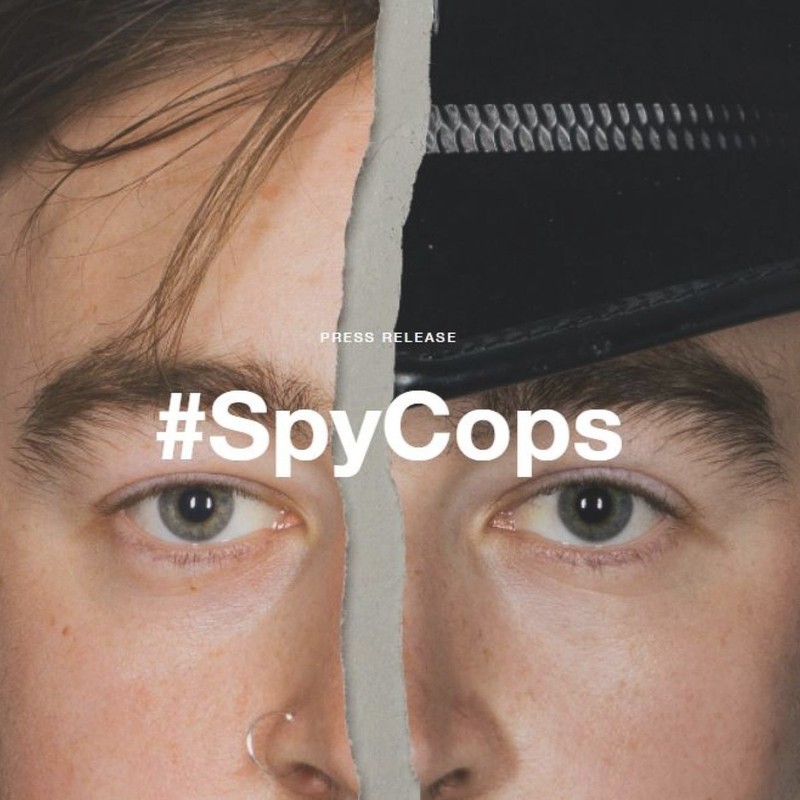Why Lush's #SpyCops Campaign Has Britain Divided
Lush’s new campaign, #SpyCops, aims to highlight the current undercover policing inquiry – a government-backed probe into alleged instances of undercover police overstepping the mark to infiltrate the lives of activists. It was promoted in window displays in Lush stores across the UK, with large posters of a police officer with the caption ‘Paid to lie’, alongside the hashtag #SpyCops and faux police tape reading ‘Police have crossed the line’.
And that’s when the uproar started. Believing it was simply an anti-police statement, thousands of people took to social media to criticise the company. A boycott hashtag soon started, #FlushLush, which saw fans of the brand videoing themselves throwing away their Lush products and vowing never to shop at the store again.
“I am a proud wife of a police officer and I am really very offended by your attempt to sully the name of my husband and his hardworking colleagues who run toward danger when everyone else runs away,” one Twitter user wrote. “No doubt one of your stores will call for the police you're now smearing when shoplifters visit. What a truly awful advertising campaign,” another added.
As the online backlash grew, police officials also began to weigh in. Calum Macleod, Chair of the Police Federation of England and Wales, said in a statement: “The Lush advertising campaign is offensive, disgusting and an insult to the hard work, professionalism and dedication of police officers throughout the UK. All it serves to do is to criticise police officers and encourage an anti-police sentiment.”
Things have escalated offline too – with multiple members of the public and off-duty police officers going into Lush stores across the country, asking staff to remove the posters. Many staff agreed to their wishes to avoid further harassment, and Lush has described the behaviour as “intimidation”.
In a recently-released statement, Lush stressed that its #SpyCops campaign was not anti-police. “We are aware that the police forces of the UK are doing an increasingly difficult and dangerous job whilst having their funding slashed,” the statement read. “We fully support them in having proper police numbers, correctly funded to fight crime, violence and to be there to serve the public at our times of need.”
The statement went onto explain that the campaign is not about the real police work done by front-line officers, but a controversial branch of political undercover policing which is currently the subject of a public enquiry.
Undercover police officers have been targeting political activists since 1968, infiltrating campaigners in a thousand organisations, ranging from the Young Liberals to Greenpeace. One method of gaining access and acceptance was for undercover officers to build relationships with women already in the groups. First, the officers stole the identity of dead children (without their familes’ permission) in order to gain a credible backstory. Then, some of these officers developed sexual relationships with female campaigners, despite having wives and children at home. One undercover police officer even had a child with one of the campaigners. Finally, they disappeared without a trace, going back to their normal lives and leaving the women traumatised.
“The sexual relationships were not individual mistakes made by undercover officers; they were a pattern of systematic abuse that was funded by the taxpayer,” Lush said. The company, along with many other activists, believe we’ve only learned about a fraction of the cases so far, and that police are still trying to cover up the true scale of the abuse.
One of the main reasons for the public enquiry into these undercover officers’ behaviour, is that the people they were spying on were not criminals, nor were they a threat to anyone’s lives. Many of the campaigners targeted were people like the parents of Stephen Lawrence, who were seeking justice for their dead son and attempting to hold the police to account. “The police have used taxpayers’ money to secretly monitor people who are trying to expose police failings,” Lush concluded.
Despite Lush’s explanation and the very real issue of police exploitation, “Go back to selling bath bombs,” and accusations of “exploiting victims to sell soap” have been common responses. But – as many fans of the brand have pointed out – Lush has a long history of activism, campaigning for issues across the spectrum of human rights, animal protection and environmental preservation.
Whether they conveyed their message in an acceptable way, however, is still very much up for debate.
DISCLAIMER: We endeavour to always credit the correct original source of every image we use. If you think a credit may be incorrect, please contact us at info@sheerluxe.com.


